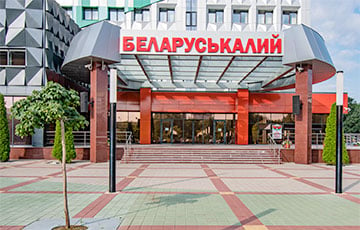Potash Disaster for Lukashenka
29- 13.01.2022, 15:11
- 59,306

A "domino effect" may follow because of the collapse of the main logistics chain.
Lukashenka's opponents forced Norway to refuse to buy raw materials for the production of fertilizers
Negotiations of the supporters of change in Belarus with the leadership of Norway and Yara were a success. The Norwegian side refused to buy Belarusian potash.
The press release that Norwegian potash producer Yara stopped buying Belarusian potash from April 1 appeared on its website on January 10. The statement says the decision was made in connection with the sanctions imposed on Belarus, writes Nezavisimaya Gazeta.
"With the support of human rights organizations and trade unions, Yara sought positive change, using its presence in Belarus to promote safety and human rights. However, the impact on the supply chain of the current sanctions against Belarus forced Yara to initiate a curtailment of supplies of Belarusian potash," reads the report of the company.
The document notes that "the impact of the current sanctions against Belarus impairs Yara ability to positively affect the safety and well-being of employees of Belaruskali. The Norwegian manufacturer intends "to continue the industrial safety program, launched in 2021, in close cooperation with the independent trade union of Belaruskali," the report quotes Svein Tore Holsether, president and CEO of Yara.
Let's recall a history of pressure on the Norwegian company that began immediately after the presidential election in Belarus. Then the workers of Belaruskali created a strike committee and called for a strike, demanding a new election. In December 2020, Yara CEO Svein Tore Holsether came to Belarus and met with the leadership of Belaruskali. He set out the conditions for the Belarusian company to comply with the "Yara Code for Business Partners".
Nevertheless, as it follows from the impending termination of supplies, it was not the position of the Norwegian producer that caused the termination of the relationship, but the actions of other participants in the supply chain.
Yara does not specify who exactly in the supply chain refuses to cooperate. There are reasons to assume that it may be Lithuania. Belarusian potash fertilizers are transported through its territory. Last December a scandal arose in that country. The government was ready to resign over the fact that the Lithuanian Railway continues to cooperate with Belaruskali.
Belarusian potash fell under U.S. and European sanctions. Whereas the European ones were quite mild (they come into force when contracts expire and cover only about 20% of Belaruskali production), the U.S. ones suggest even a secondary effect. It means a penalty not only for the Belarusian manufacturer's contractors but also for their partners.
Potassium is an important export product for Belarus. The country makes about $2.5 billion annually from its sale. Direct European sanctions are not a big threat to the economy. Europe is not the main purchaser of this product. The main supply goes to Brazil (21.6%), China (13.3%) and India (12%). As for Norway, its share barely exceeds 3% of total exports. In money terms, it was $74 million.
If the termination of the contract with Yara had been the only result of the sanctions, Belarus would have been able to replace the dropped out volumes. The termination of cooperation with the Norwegian company has more image losses than monetary ones. A much greater threat is the break in the chains to which the Norwegian manufacturer refers. The point is that almost all of Belarus' potash is delivered via Lithuania. Belarus has a share in the bulk terminal in the port of Klaipeda.
Minsk is discussing with Moscow the prospects of redirecting transit flows to Russian ports, but there are several obstacles to this. In particular, the lack of technical capacity for transhipment. Besides, since Russia itself is an exporter of potash fertilizers, it is not very interested in saving a competitor. Experts in the industry suggested earlier that the merger of Belaruskali and Uralkali may be a way out of the situation. Igor Udovitsky, the owner of Biriu kroviniu terminalas in Klaipeda, through which Belarusian fertilizers are exported, told this.
Let us recall that in 2005-2013, Belaruskali and Uralkali already exported their products together through the Belarusian Potash Company (BPC). However, then they scandalously "broke up". Vladislav Baumgertner, former Uralkali's Director-General, was even jailed in Belarus. Now Belarus has to cooperate playing a beggar rather than a dictator.









